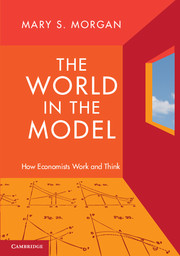Book contents
- Frontmatter
- Contents
- Figures, Tables, and Boxes
- Preface
- 1 Modelling as a Method of Enquiry
- 2 Model-Making: New Recipes, Ingredients, and Integration
- 3 Imagining and Imaging: Creating a New Model World
- 4 Character Making: Ideal Types, Idealization, and the Art of Caricature
- 5 Metaphors and Analogies: Choosing the World of the Model
- 6 Questions and Stories: Capturing the Heart of Matters
- 7 Model Experiments?
- 8 Simulation: Bringing a Microscope into Economics
- 9 Model Situations, Typical Cases, and Exemplary Narratives
- 10 From the World in the Model to the Model in the World
- Index
- Plate Section
- References
1 - Modelling as a Method of Enquiry
Published online by Cambridge University Press: 05 November 2012
- Frontmatter
- Contents
- Figures, Tables, and Boxes
- Preface
- 1 Modelling as a Method of Enquiry
- 2 Model-Making: New Recipes, Ingredients, and Integration
- 3 Imagining and Imaging: Creating a New Model World
- 4 Character Making: Ideal Types, Idealization, and the Art of Caricature
- 5 Metaphors and Analogies: Choosing the World of the Model
- 6 Questions and Stories: Capturing the Heart of Matters
- 7 Model Experiments?
- 8 Simulation: Bringing a Microscope into Economics
- 9 Model Situations, Typical Cases, and Exemplary Narratives
- 10 From the World in the Model to the Model in the World
- Index
- Plate Section
- References
Summary
From Laws to Models, From Words to Objects
Two hundred years ago, political economy was overwhelmingly a verbal science, with questions, concepts, and a mode of reasoning all dependent on words. As a science, classical political economy of the eighteenth and early nineteenth centuries began with individuals, theorized their relations, and posited a few general laws that operated at a community level. One of the few laws that was expressed in mathematics was proposed by the Rev’d Thomas Robert Malthus, who claimed that the growth of population, driven by passions, increased in a way that would inevitably outstrip the more pedestrian growth of food supplies. So, he argued, there must also be checks at work in the world: the numbers of people were kept in check either through the vices of disease, famine, and war, or by virtue of celibacy or delayed marriage. While such laws might indeed have an iron grip on economic life, it was not thought easy to perceive these laws at work amongst the complicated changing events of everyday life. This created difficulties for the art of political economy, namely fashioning policy in line with an understanding of those scientific principles of political economy.
Economics is now a very different kind of activity. From the late nineteenth century, economics gradually became a more technocratic, tool-based, science, using mathematics and statistics embedded in various kinds of analytical techniques. By the late twentieth century, economics had become heavily dependent on a set of reasoning tools that economists now call ‘models’: small mathematical, statistical, graphical, diagrammatic, and even physical objects that can be manipulated in various different ways. Today, in the twenty-first century, if we go to an economics seminar, or read a learned scientific paper in that field, we find that economists write down some equations or maybe draw a diagram, and use those to develop solutions to their theoretical conundrums or to answer questions about the economic world. These manipulable objects are the practical starting point in economic research work: they are used for theorizing, providing hypotheses and designing laboratory experiments, they are an essential input into simulations, and they form the basis for much statistical work. Economics teaching is similarly bounded: students learn by working through a set of models: some portraying decisions by individuals and companies, others representing the behaviour of the whole economy, and for every level in between.
- Type
- Chapter
- Information
- The World in the ModelHow Economists Work and Think, pp. 1 - 43Publisher: Cambridge University PressPrint publication year: 2012
References
- 1
- Cited by



